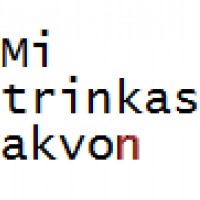Top Ten Best Things About Esperanto
Esperanto is an artificial auxillary language created in 1887 by Ludvig Lejzer Zamenhof, as a way to create an international language, and as a result, was made to be as easy as possible. Even if it never officially became the international language, it's still the largest conlang (constructed language) in the world, and approximately 1 million people speak the language, including me! So I've decided to make a list here about the best things about Esperanto.Do kun tio dirita, ni komencu!
The flexibility allows for more free word orders, you don't always need to have the subject first, and object last, etc. Thanks to the accusative case, where you add -n to direct objects, you can freely change the word order, because you always know what the speaker is trying to say thanks to the accusative suffix. That's not to say there is a preffered word order, as most people speak in a Subject-Verb-Object manner, but you're still free to change the word order.
Studies have shown that people who studied Esperanto for 2 years, and then another foreign language say French for 3 years, then that person would have a higher competency in French than someone who studied it for five straight years, and this is one of the main reasons I started learning Esperanto. Plus, Esperanto has a huge vocabulary of french, english and german words, so if you speak Esperanto, you have a nice headstart in those languages.
I wouldn't say it's COMPLETELY without irregularities, considering the naming of countries is a nightmare in Esperanto if you're not familiar with geography, but otherwise, there are barely any exceptions in grammar. All nouns end in -o, adjectives in -a, adverbs in -e, each verb is conjugated the same way, etc.

Accusative is a grammatical case, most often used to show the direct object in a language. In Esperanto, it's shown by adding -n to a direct object. Most anglophoners and speakers of the famous languages of today like spanish or french aren't familiar with a grammatical case, as those languages have long since dropped the case system (unfortunately) and thus, most people think the accusative case is one of the hardest aspects of this language. I'd say it's a great part actually, because like I said on #2, it makes it a good introduction to other languages, showing at least one grammatical case.
Even though I like a challenge, the simplicity is a vital part of Esperanto. An international language should be easy (unlike la angla), and that's what Esperanto is supposed to be, so the simplicity makes learning Esperanto mere play, as Dr. Zamenhof himself put it.
This kinda ties with #1 in being incredibly flexible. For example, instead of saying "Mi estas felicxa", which means I'm happy, you can cut estas and put the verb-ending on the adjective, so that it becomes "Mi felicxas", which means the same thing. It's really great!
Well..., duh! That's one of the main reasons Esperanto was made, as the concept was that everyone would speak a native language, plus a second one, Esperanto. A language barrier can be greater than any physical border, and when you don't understand others, you view them as different, which can lead to..., problems. So, Esperanto was made to tear apart that border, so that everyone'd be friends. And this is still a thing today.

Yes, Esperanto does actually have its own culture, or should I say the esperantists have their own culture. For example are there native esperanto slang words, such as mojosa (cool), krokodili (to speak a native language when esperanto is more appropriate) and kabei (to leave the Esperanto movement). There are even esperanto music artists, and so on! Not to mention it's a welcoming culture! There's also Pasporta Servo, a service, in which if you speak Esperanto, you can actually travel to another country without paying for a place to stay, if you have an esperantist friend in that country (if they are happy to host you). So if ever want to travel cheaper, lernu Esperanton!

Of course, this is a minor thing in Esperanto and thus it can't be any higher than this, but I mean, it's still part of the language I suppose! I really like it, with the green banner, white top-left square and the green star representing the five continents of our planet. Fun Fact: Had it not been for this flag, socialism wouldn't have the red star as an emblem, as this flag kinda inspired it.
Esperanto isn't THAT efficient. But, no language is completely inefficient. Esperanto might not be efficient if you want to speak with someone on the street, but it's efficient in a lot of other ways. It's a good introduction to other languages, you still learn a language, and there's an actual culture!